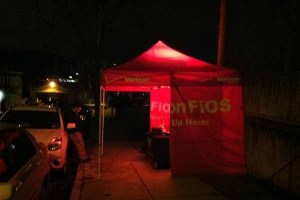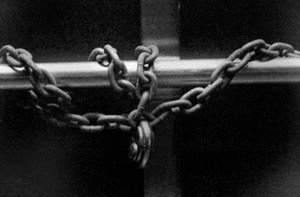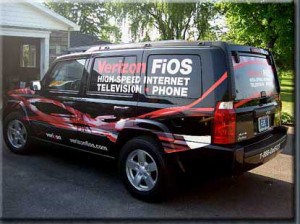
Although Verizon Communications has stopped expanding its FiOS fiber-to-the-home service outside of areas it already committed to serve, its gradual rollout continues in Philadelphia.
Gradual is right. On Kalos Street in the Wissahickon section of Philly, it all depends on which side of the road your house resides. Odd-numbered customers were in luck this week as Verizon took its marketing efforts to the street, with a temporary tent emblazoned with Verizon’s logo installed on the sidewalk, giving pedestrians a few minutes of warmth from a portable heater.

FiOS tent (Courtesy: J. Chakars/WHYY NewsWorks)
Inside the tent, would-be customers are given a preview of the fiber optic service and some free gifts just for stopping by on the cold winter night. Those who took Verizon up on its offer walked away with free ice skating tickets. Those that didn’t got a refrigerator magnet and a tote bag as consolation prizes.
Verizon’s sales force, braving the weather, has made inroads in the city that is home to Comcast’s corporate headquarters.
Joanne Weill-Greenberg told WHYY/NewsWorks she called Comcast to deal for a lower rate and Comcast refused to match Verizon FIOS’ introductory offer. She is now an ex-Comcast customer, and not just for the money. She explained FiOS offers channels Comcast does not carry, and because FiOS also carries Comcast’s regional sports channel, there is nothing holding them to the cable company.
The Verizon tent does not stay in any one location too long.
In a few days, they will relocate to another neighborhood that is now primed for fiber upgrades from the phone company.
Pennsylvania residents can just be thankful the winter weather has not gotten brutal enough for Verizon to deploy its inflatable igloo.


 Subscribe
Subscribe
 As it turns out, Bob had simply outsourced his own job to a Chinese consulting firm. Bob spent less than one fifth of his six-figure salary for a Chinese firm to do his job for him. Authentication was no problem, he physically FedEx’d his RSA token to China so that the third-party contractor could log-in under his credentials during the workday. It would appear that he was working an average 9 to 5 work day. Investigators checked his web browsing history, and that told the whole story.
As it turns out, Bob had simply outsourced his own job to a Chinese consulting firm. Bob spent less than one fifth of his six-figure salary for a Chinese firm to do his job for him. Authentication was no problem, he physically FedEx’d his RSA token to China so that the third-party contractor could log-in under his credentials during the workday. It would appear that he was working an average 9 to 5 work day. Investigators checked his web browsing history, and that told the whole story. The nation’s largest broadband stimulus grant recipient has turned a $126.3 million taxpayer funded broadband expansion program into an “orchestrated train wreck,”
The nation’s largest broadband stimulus grant recipient has turned a $126.3 million taxpayer funded broadband expansion program into an “orchestrated train wreck,” 


 While a lot of people would love to get Verizon to wire their communities for the company’s fiber optic network, at least three New York City multi-dwelling unit property owners have told Verizon to get lost, in some cases telling the company none of their tenants were interested in the top-rated fiber to the home network, even as they remain without phone service three months after Hurricane Sandy damaged Verizon’s facilities in the city.
While a lot of people would love to get Verizon to wire their communities for the company’s fiber optic network, at least three New York City multi-dwelling unit property owners have told Verizon to get lost, in some cases telling the company none of their tenants were interested in the top-rated fiber to the home network, even as they remain without phone service three months after Hurricane Sandy damaged Verizon’s facilities in the city. boneheads that own my building that nobody was interested,” says Brad, a Stop the Cap! reader in Manhattan. “The morons at the property management company don’t have a clue or they want money from Verizon in return for the keys. Meanwhile, there is no dial tone and Verizon says they are at an impasse until the property owners, who obviously don’t care, let them in to do repairs.”
boneheads that own my building that nobody was interested,” says Brad, a Stop the Cap! reader in Manhattan. “The morons at the property management company don’t have a clue or they want money from Verizon in return for the keys. Meanwhile, there is no dial tone and Verizon says they are at an impasse until the property owners, who obviously don’t care, let them in to do repairs.”
